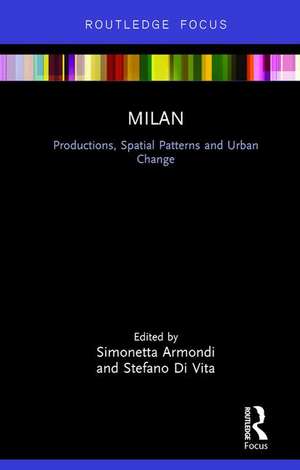Milan: Productions, Spatial Patterns and Urban Change: Built Environment City Studies
Editat de Simonetta Armondi, Stefano Di Vitaen Limba Engleză Hardback – 22 aug 2017
Accordingly, this book explores the contentious geographies of innovation, productions and working spaces, both empirically and theoretically in a city that, since the beginning of the 2000s, has been involved in a process of urban change, with relevant spatial and socio-economic effects, within an increasingly turbulent world economy. Through this analysis, the book provides an insight into the complexity of contemporary urban phenomena beyond a traditional metropolitan lens, highlighting issues such as rescaling, urban decentralization and recentralization, extensive urban transformation and shrinkage and molecular urban regeneration.
This book is a valuable resource for academics, researchers and scholars focusing on Urban Studies such as Urban Policy, Urban Planning, Urban Geography, Urban Economy and Urban Sociology.
| Toate formatele și edițiile | Preț | Express |
|---|---|---|
| Paperback (1) | 124.95 lei 6-8 săpt. | |
| Taylor & Francis – 21 ian 2023 | 124.95 lei 6-8 săpt. | |
| Hardback (1) | 462.60 lei 6-8 săpt. | |
| Taylor & Francis – 22 aug 2017 | 462.60 lei 6-8 săpt. |
Preț: 462.60 lei
Nou
Puncte Express: 694
Preț estimativ în valută:
88.52€ • 92.42$ • 73.26£
88.52€ • 92.42$ • 73.26£
Carte tipărită la comandă
Livrare economică 04-18 aprilie
Preluare comenzi: 021 569.72.76
Specificații
ISBN-13: 9781138244795
ISBN-10: 1138244791
Pagini: 156
Ilustrații: 14 Halftones, black and white; 4 Tables, black and white; 18 Illustrations, black and white
Dimensiuni: 138 x 216 x 15 mm
Greutate: 0.29 kg
Ediția:1
Editura: Taylor & Francis
Colecția Routledge
Seria Built Environment City Studies
Locul publicării:Oxford, United Kingdom
ISBN-10: 1138244791
Pagini: 156
Ilustrații: 14 Halftones, black and white; 4 Tables, black and white; 18 Illustrations, black and white
Dimensiuni: 138 x 216 x 15 mm
Greutate: 0.29 kg
Ediția:1
Editura: Taylor & Francis
Colecția Routledge
Seria Built Environment City Studies
Locul publicării:Oxford, United Kingdom
Public țintă
PostgraduateCuprins
Introduction
1. Which Milan? Setting the scene for reflecting urban decline, resilience, and change 2. Urban regionalization and metropolitan resurgence: discontinuity and persistence of a spatial dialectic 3. The attractiveness of Milan and the spatial patterns of international firms 4. Creative production and urban regeneration in Milan
5. Sharing economy: makerspaces, co-working spaces, hybrid workplaces, and new social practices
6. Forms of urban change. Nodes of knowledge-based networks as drivers of new metropolitan patterns in Southern Milan
7. Urban change and geographies of production in North East Milan
8. Urban change and innovation of functions and productions in the north-western transect of the Milan urban region
9. Territorial infrastructures and new production places
10. The last cycle of Milan urban policies and the prospects for a new urban agenda
1. Which Milan? Setting the scene for reflecting urban decline, resilience, and change 2. Urban regionalization and metropolitan resurgence: discontinuity and persistence of a spatial dialectic 3. The attractiveness of Milan and the spatial patterns of international firms 4. Creative production and urban regeneration in Milan
5. Sharing economy: makerspaces, co-working spaces, hybrid workplaces, and new social practices
6. Forms of urban change. Nodes of knowledge-based networks as drivers of new metropolitan patterns in Southern Milan
7. Urban change and geographies of production in North East Milan
8. Urban change and innovation of functions and productions in the north-western transect of the Milan urban region
9. Territorial infrastructures and new production places
10. The last cycle of Milan urban policies and the prospects for a new urban agenda
Notă biografică
Simonetta Armondi is a researcher in political and economic geography, and Professor of Urban and Regional Analysis at the Politecnico di Milano, Italy. Her research and teaching activities focus on the geography of urban change related to economic restructuring, contemporary capitalisms and urban policies.
Stefano Di Vita is a Research Fellow and adjunct Professor at the Politecnico di Milano, Italy, where he carries out research and teaching activities in the fields of regional and urban planning and design. His main interests concern phenomena and tools of urban change processes supported by both ordinary and extraordinary projects.
Stefano Di Vita is a Research Fellow and adjunct Professor at the Politecnico di Milano, Italy, where he carries out research and teaching activities in the fields of regional and urban planning and design. His main interests concern phenomena and tools of urban change processes supported by both ordinary and extraordinary projects.
Descriere
This book explores the contentious geographies of innovation, productions and working spaces, both empirically and theoretically in Milan. The book provides an insight into the complexity of contemporary urban phenomena beyond a traditional metropolitan lens, highlighting issues such as rescaling, urban decentralization and recentralization.















